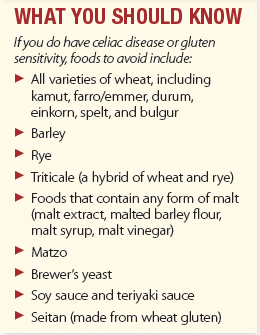Is Going Gluten-Free a Smart Strategy for You?
In recent years, the number of “gluten-free” food products has grown substantially. That’s because gluten—a type of protein found in wheat, barley, triticale, and rye—can trigger a host of unpleasant symptoms, including diarrhea and abdominal pain, in people who have celiac disease or gluten sensitivity.
However, skipping gluten isn’t necessarily a healthy option for people who don’t have any gluten-related health conditions, contrary to what some food manufacturers would have you believe. Here’s what you need to know about health problems that are linked with gluten consumption.

Celiac Disease
Celiac disease is an autoimmune condition in which the body’s immune system attacks the lining of the small intestine when gluten is present. Celiac disease affects an estimated 1 in 100 people around the world. Many people are unaware they have the condition; the Celiac Disease Foundation estimates that more than 2 million Americans may be undiagnosed.
The classic symptoms of celiac disease include diarrhea, cramps, nausea, bloating, and constipation. However, other symptoms occur in areas other than the digestive tract, including:
- Fatigue
- Skin rash
- Bone and joint pain
- Unexplained iron-deficiency anemia
- Depression
- Migraines
A blood test that checks for certain antibody proteins can help diagnose celiac disease. It’s important not to eliminate gluten from your diet before the blood test, since doing so can make your blood test show a false “normal” result. A genetic test can help rule out celiac disease. And, your doctor may do an endoscopy of your small intestine to check for any damage that has occurred.
The only treatment for celiac disease is to eliminate gluten from your diet. If you have celiac disease, your body’s ability to absorb nutrients may be impaired, which can result in nutrient deficiencies and raise the risk of osteoporosis. You need to discuss these possibilities with your doctor, who can order appropriate tests and determine what, if any, treatment is needed.
Gluten Sensitivity
Some people test negative for celiac disease but have symptoms that stop when they avoid eating gluten. This condition is often referred to as “non-celiac gluten sensitivity” or “gluten sensitivity.” However, researchers have not confirmed that gluten is the only substance that causes symptoms for some people, and one theory is that a group of foods called FODMAPs, may be responsible.
FODMAPs are foods that contain certain types of carbohydrates, and wheat, barley, and rye—grains that contain gluten—are also FODMAPs. Other FODMAPs include garlic, onions, some fruits and vegetables, legumes, sweeteners, and some dairy foods. Some people with irritable bowel syndrome have found that following a diet low in FODMAPs relieves their symptoms.
Wheat Allergy
Having a wheat allergy is different from gluten-related conditions. There are four proteins in wheat—gluten, albumin, globulin, and gliadin—that are linked to allergic reactions. Also, although a wheat allergy can cause diarrhea, cramps, and nausea, it can also trigger symptoms similar to other allergies, such as hives or an itchy skin rash, swelling or irritation of the mouth or throat, watery eyes, or. in severe cases, anaphylaxis (narrowed airways that make breathing difficult).
A skin test can often reveal whether you have a wheat allergy.
Going Gluten-Free
It can be challenging to eliminate all gluten or wheat from your diet. However, many restaurants now offer gluten-free options, and the number of gluten- and wheat-free food products continues to increase. There are also many resources available, from books and magazines to support groups and websites.
Before you give up your whole-wheat toast or go searching for gluten-free pasta, have your symptoms tested by a doctor. You need to know if your diet is responsible for your symptoms, but it’s also important to rule out celiac disease and gluten sensitivity so you don’t needlessly limit your food options. Many whole-grain foods that contain gluten provide valuable nutrients, including fiber and complex carbohydrates.
The post Is Going Gluten-Free a Smart Strategy for You? appeared first on University Health News.
Read Original Article: Is Going Gluten-Free a Smart Strategy for You? »

